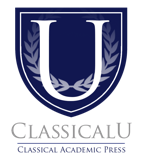Back to Course
Introduction to Classical Education
0% Complete
0/0 Steps
-
Introduction
Course Introduction: Introduction to Classical Education (Preview Content)5 Topics -
LessonsLesson 1: A Clear Definition of Classical Education (Preview Content)5 Topics|1 Quiz
-
Lesson 2: Clear Words for Classical Education (Preview Content)6 Topics|1 Quiz
-
Lesson 3: To What Shall I Compare Classical Education?3 Topics|1 Quiz
-
Lesson 4: Various Models of Classical Education6 Topics|1 Quiz
-
Lesson 5: The Major Elements of Classical Education3 Topics|1 Quiz
-
Lesson 6: Tracing the History of Classical Education (part one)3 Topics
-
Lesson 6: Tracing the History of Classical Education (part two)3 Topics|1 Quiz
-
Lesson 7: Why Classical Education?5 Topics|1 Quiz
-
Lesson 8: Communal Education (Paideia)6 Topics|1 Quiz
-
Lesson 9: Implementing Classical Education5 Topics|1 Quiz
-
Lesson 10: The Developing Models of Classical Education3 Topics|1 Quiz
-
Lesson 11: Deepening Our Understanding of Classical Education3 Topics|1 Quiz
-
Lesson 12: How to Read Well (Dr. Perrin's Top 55 Books on Classical Ed) (Preview Content)16 Topics
-
Dr. Perrin's Top 55 Books on Classical Ed - Introductory Books
-
Dr. Perrin's Top 55 Books on Classical Ed - History of Classical Education
-
Dr. Perrin's Top 55 Books on Classical Ed - Modern Education
-
Dr. Perrin's Top 55 Books on Classical Ed - Philosophy of Education
-
Dr. Perrin's Top 55 Books on Classical Ed - Mathematics & Science
-
Dr. Perrin's Top 55 Books on Classical Ed - Virtue and Embodiment
-
Dr. Perrin's Top 55 Books on Classical Ed - Scholé and Contemplation
-
Dr. Perrin's Top 55 Books on Classical Ed - Pedagogy, Art of Teaching
-
Dr. Perrin's Top 55 Books on Classical Ed - Top Ten List 101 Version
-
Dr. Perrin's Top 55 Books on Classical Ed - Top Ten List 102 Version
-
Dr. Perrin's Top 55 Books on Classical Ed - Lifetime Reading Plan
-
Outline of Session
-
Reading List (PDF)
-
Top 55 Reading List (PDF)
-
Reading List (HTML)
-
Discussion Questions
-
Dr. Perrin's Top 55 Books on Classical Ed - Introductory Books
-
End of Course TestEnd-of-Course Test: Introduction to Classical Education1 Quiz
Lesson 9,
Topic 3
In Progress
Discussion Questions
Lesson Progress
0% Complete
- How is classical Christian education for a child but not child-centered?
- Share a time when you experienced truth, goodness, and beauty holding the attention of the students in your school or homeschool.
- How is modern education an education in anxiety? Does this serve the utilitarian end of education (job skills) well?
- Discuss the following: Classical education provides a coherent theory of knowledge. The world is like a web of interrelated truths. To know anything that is true is to know about God who is true.


